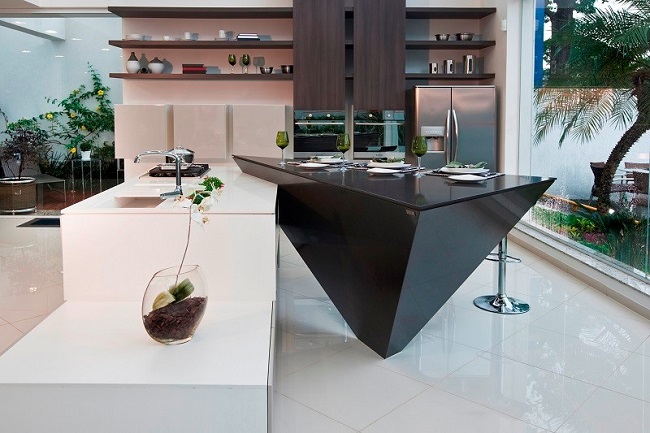Silestone is a stone made with quartz and minor inclusions of granite, silica and polyester resin. It is used to make worktops and surfaces in kitchens and bathrooms. With its various properties like hardness, scratch-resistance, and bacteria-resistance, this stone is a good option for people who are looking for durability as well as beautiful finish. Read on to know more.
Silestone is an engineered stone made with quartz with minor additions of granite, silica and polyester resin. It is used for making surfaces like kitchen worktops and sinks. It can easily leave behind many conventional surfaces like granite in the matter of hardness – only sapphires and diamonds are known to be harder than it. Apart from this very favorable quality, silestone is very dense and absolutely non-porous, meaning it doesn’t ever require to be sealed or polished, and is maintenance-free.
Many individuals who have been using Silestone for years on end say that they find them to be still looking new and would prefer it over any other material if they get a new home. With the great matte finish that Silestone retains for years on end, it’s no wonder people find it to be a great asset for their home.
Silestone is an engineered stone made with quartz with minor additions of granite, silica and polyester resin. It is used for making surfaces like kitchen worktops and sinks. It can easily leave behind many conventional surfaces like granite in the matter of hardness – only sapphires and diamonds are known to be harder than it. Apart from this very favorable quality, silestone is very dense and absolutely non-porous, meaning it doesn’t ever require to be sealed or polished, and is maintenance-free.
Many individuals who have been using Silestone for years on end say that they find them to be still looking new and would prefer it over any other material if they get a new home. With the great matte finish that Silestone retains for years on end, it’s no wonder people find it to be a great asset for their home.
What’s So Special About Silestone?
- Stain resistant: As it is nonporous, stains of everyday products used in the kitchens like coffee, wine, oil, vinegar, or in the bathrooms like make-up, shaving creams etc., can be easily cleaned just with the wipe of a damp cloth. There is no stain whatsoever.
- Acid resistant: Since quartz is one of the hardest minerals known on earth, external aggression like mild acidic spills from lemon or even lab chemicals do nothing to harm it. So, they can be easily used in laboratories as well.
- Scratch resistant: Chop or cut right on the worktop, without worrying about disfigured surfaces. Silestone is very conveniently scratch resistant Even your cat will get tired of clawing at your worktop, without even so much as making a dent.
- Impact resistant: With the hardness of quartz, elasticity of polyester resin, and the vibro compression technology used during the manufacture, feel free to drop on it cutlery, pots, pans, or just about anything you fancy; Silestone will shine through it all.
- Bacteriostatic: It is the only stone to have a unique formula that ingrains silver ions to resist bacteria build up on surfaces. Spaces like kitchens and bathrooms have the most affinity for germ propagation, but with Silestone, you can be assured of a disease-free space.
- Available in a wide range of colors and textures: The stone is available in more than 50 colors and textures. So, no matter what your design idea is, there’s one for everyone!
All these properties of Silestone that makes its a very desirable product. However, there is one thing you need to be wary of — it can crack under prolonged exposure to heat such as from placing hot pans or pots. If you are often using your worktop to place hot vessels, then it is recommended that you opt for granite which has better heat resistance. The other option is to tweak your cooking habits a little, just keep a wad of dishcloths on the surface to place your hot utensils on.
Do you have Silestone in your homes or anyone else’s that you know? What do you think ?
